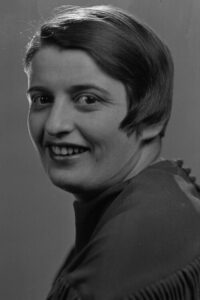
Anthem
It is a sin to write this. It is a sin to think words no others think and to put them down upon a paper no others are to see. It is base and evil. It is as if we were speaking alone to no ears but our own. And we know well that there is no transgression blacker than to do or think alone. We have broken the laws. The laws say that men may not write unless the Council of Vocations bid them so. May we be forgiven!
But this is not the only sin upon us. We have committed a greater crime, and for this crime, there is no name. What punishment awaits us if it be discovered we know not, for no such crime has come in the memory of men and there are no laws to provide for it.
It is dark here. The flame of the candle stands still in the air. Nothing moves in this tunnel save our [-hand-] {+hands+} on the paper. We are alone here under the earth. It is a fearful word, alone. The laws say that none among men may be alone, ever and at any time, for this is the great transgression and the root of all evil. But we have broken many laws. And now there is nothing here save our one body, and it is strange to see only two legs stretched on the ground, and on the wall before us the shadow of our one head.
The walls are cracked and water runs upon them in thin threads without sound, black and glistening as blood. We stole the candle from the larder of the Home of the Street Sweepers. We shall be sentenced to ten years in the Palace of Corrective Detention if it is discovered. But this matters not. It matters only that the light is precious and we should not waste it to write when we need it for that work which is our crime. Nothing matters save the work, our secret, our evil, our precious work. Still, we must also write, for—may the [-council-] {+Council+} have mercy upon us!—we wish to speak for once to no ears but our own.
Our name is Equality 7-2521, as it is written on the iron bracelet that all men wear on [-the-] {+their+} left wrists with their names upon it. We are twenty-one years old. We are six feet tall, and this is a burden, for there are not many men who are six feet tall. Ever have the Teachers and the Leaders pointed to us and frowned and said: “There is evil in your bones…
Read or download Book
Ayn Rand
Alice O’Connor (February 2 [O.S. January 20], 1905 – March 6, 1982), better known by her pen name Ayn Rand, was a Russian-born American author and philosopher. She is known for her fiction and for developing a philosophical system she named Objectivism. Born and educated in Russia, she moved to the United States in 1926. After two early novels that were initially unsuccessful and two Broadway plays, Rand achieved fame with her 1943 novel The Fountainhead. In 1957, she published her best-selling work, the novel Atlas Shrugged. Afterward, until she died in 1982, she turned to non-fiction to promote her philosophy, publishing her periodicals and releasing several collections of essays.
Rand advocated reason and rejected faith and religion. She supported rational and ethical egoism as opposed to altruism. In politics, she condemned the initiation of force as immoral and supported laissez-faire capitalism, which she defined as the system based on recognizing individual rights, including private property rights. Although she opposed libertarianism, which she viewed as anarchism, Rand is often associated with the modern libertarian movement in the United States. In art, she promoted romantic realism. She was sharply critical of most philosophers and philosophical traditions known to her, with a few exceptions.
Rand’s books have sold over 37 million copies. Her fiction received mixed reviews from literary critics, with reviews becoming more negative for her later work. Although academic interest in her ideas has grown since her death, academic philosophers have generally ignored or rejected Rand’s philosophy, arguing that she has a polemical approach and that her work lacks methodological rigor. Her writings have politically influenced some right-libertarians and conservatives. The Objectivist movement circulates her ideas, both to the public and in academic settings.
Life
Rand was born Alisa Zinovyevna Rosenbaum on February 2, 1905, into a Jewish bourgeois family living in Saint Petersburg in what was then the Russian Empire. She was the eldest of three daughters of Zinovy Zakharovich Rosenbaum, a pharmacist, and Anna Borisovna (née Kaplan). She was 12 when the October Revolution and the rule of the Bolsheviks under Vladimir Lenin disrupted her family’s lives. Her father’s pharmacy was nationalized, and the family fled to the city of Yevpatoria in Crimea, which was initially under the control of the White Army during the Russian Civil War. After graduating high school there in June 1921, she returned with her family to Petrograd (as Saint Petersburg was then named), where they faced desperate conditions, occasionally nearly starving.
When Russian universities were opened to women after the revolution, Rand was among the first to enroll at Petrograd State University. At 16, she began her studies in the Department of Social Pedagogy, majoring in history. She was one of many bourgeois students purged from the university shortly before graduating. After complaints from a group of visiting foreign scientists, many purged students, including Rand, were reinstated. She completed her studies at the renamed Leningrad State University in October 1924. She then studied for a year at the State Technicum for Screen Arts in Leningrad. For an assignment, Rand wrote an essay about the Polish actress Pola Negri; it became her first published work. By this time, she had decided her professional surname for writing would be Rand, and she adopted the first name Ayn.
In late 1925 Rand was granted a visa to visit relatives in Chicago. She arrived in New York City on February 19, 1926. Intent on staying in the United States to become a screenwriter, she lived for a few months with her relatives learning English before leaving for Hollywood, California.
In Hollywood, a chance meeting with director Cecil B. DeMille led to work as an extra in his film The King of Kings and a subsequent job as a junior screenwriter. While working on The King of Kings, she met the aspiring actor Frank O’Connor; they married on April 15, 1929. She became a permanent American resident in July 1929 and an American citizen on March 3, 1931. She tried to bring her parents and sisters to the United States, but they could not obtain permission to emigrate.






